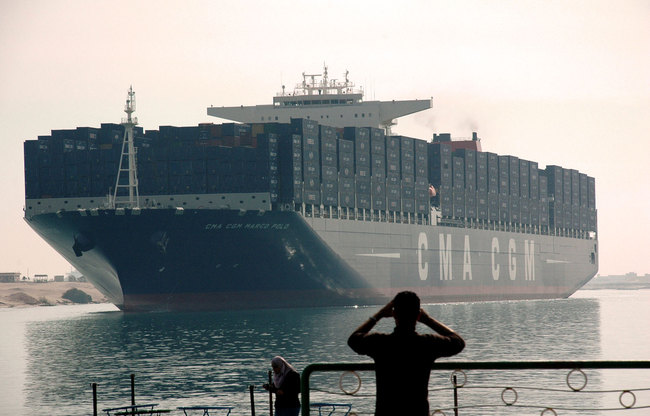
(AFP Photo)
The business and finance community is worried that the government may crowd out private sector banking with its plan to finance the digging and expansion of the Suez Canal by offering investment certificates that mature after five years and with a 12% yield paid out every three months.
“The banking liquidity available to the private sector is ‘very weak’, and does not exceed EGP 450bn out of a total EGP 1.2tn in deposits,” said Hisham Tawfiq, chairman of Arabiya Online and a board member of the stock exchange.
“And the reason for this is that the government is crowding out the private sector, withdrawing the liquidity of banks, which are underwriting the government’s debt instruments to finance the budget deficit,” he added.
Central Bank of Egypt (CBE) Governor Hisham Ramez will hold a press conference on Sunday to discuss issues surrounding the procedures for offering investment certificates for the Suez Canal – from the the underwriting of them, whether they would be offered in dollars, their terms of maturity, and the possibility of allowing Arab and foreign institutions to subscribe or not, and whether government banks would be allowed to buy in should there not be enough individual and institutional investment.
Tawfiq added that “the government must exempt government banks from underwriting investment certificates for the canal in order to avoid putting pressure on banking liquidity, and to secure this financing for expansions in the private sector and boost taxes.” Tawfiq believes that “individuals and non-bank institutions will not be able to finance the EGP 60bn required,” but insisted that government banks should be excluded in order to preserve banking liquidity.
Whether government banks will be permitted to subscribe to investment certificates remains an open question, but Investment Minister Ashraf Salman has noted in previous press statements that government banks may be permitted to do so, though this was met with resistance from representatives of the business and finance community, who feared the pressure this would create on banking liquidity.
Mohamed Farid, president of Dcode Economic and Financial Consulting, believes that the government should offer investment certificates for the canal over several stages to allow for individuals and non-banking institutions to buy in and to provide the estimated EGP 60bn needed to fund the project. “An offering made all at once will not provide the required amount from individuals and non-banking institutions,” he said.
“Offering over stages allows individuals to liquidate part of their deposits and will not affect the total volume of deposits, which amount to EGP 1.2tn. This will thus provide the liquidity, and you won’t force government banks to enter the financing process of the offerings and banking liquidity won’t be put under pressure,” said Farid.
According to Farid, offerings over multiple stages reduces the chance of resorting to the banks, which makes funding come from citizens receiving returns exceeding 8% on bank deposits. This would be in line with the goal announced by President Abdel Fattah al-Sisi, that Egyptians take part in the revenues of development projects in their country, something which will not happen if banks finance the project, Farid said.
“An offering of investment certificates in the Suez Canal inevitably puts pressure on the liquidity available in banks and crowds out financing for their original activities, like financing investments for the private and public sectors, or financing public debt for the government by purchasing bonds and treasury bills,” said Hany Tawfiq, president of the Egyptian Investors Association.
Tawfiq notes that “foreigners must be allowed to buy certificates to allow for new funds to enter the banking system.” Tawfiq suggests “listing canal certificates on the stock exchange with reduced fees for purchase over five years and without fines, in order to keep liquidity high.”
But CBE governor Ramez said the investment certificates are guaranteed, and would not affect bank savings’ rates, or the level of liquidity in the country, pointing out that returns of 12% are higher than the market rate.
In a phone call to the television station Sada al-Balad last week, Ramez added that “these certificates are one of the financing instruments that will move easily through the banks, helping increase the volume of financing in the banking sector to finance various national projects, which begin with the new Suez Canal project.”




